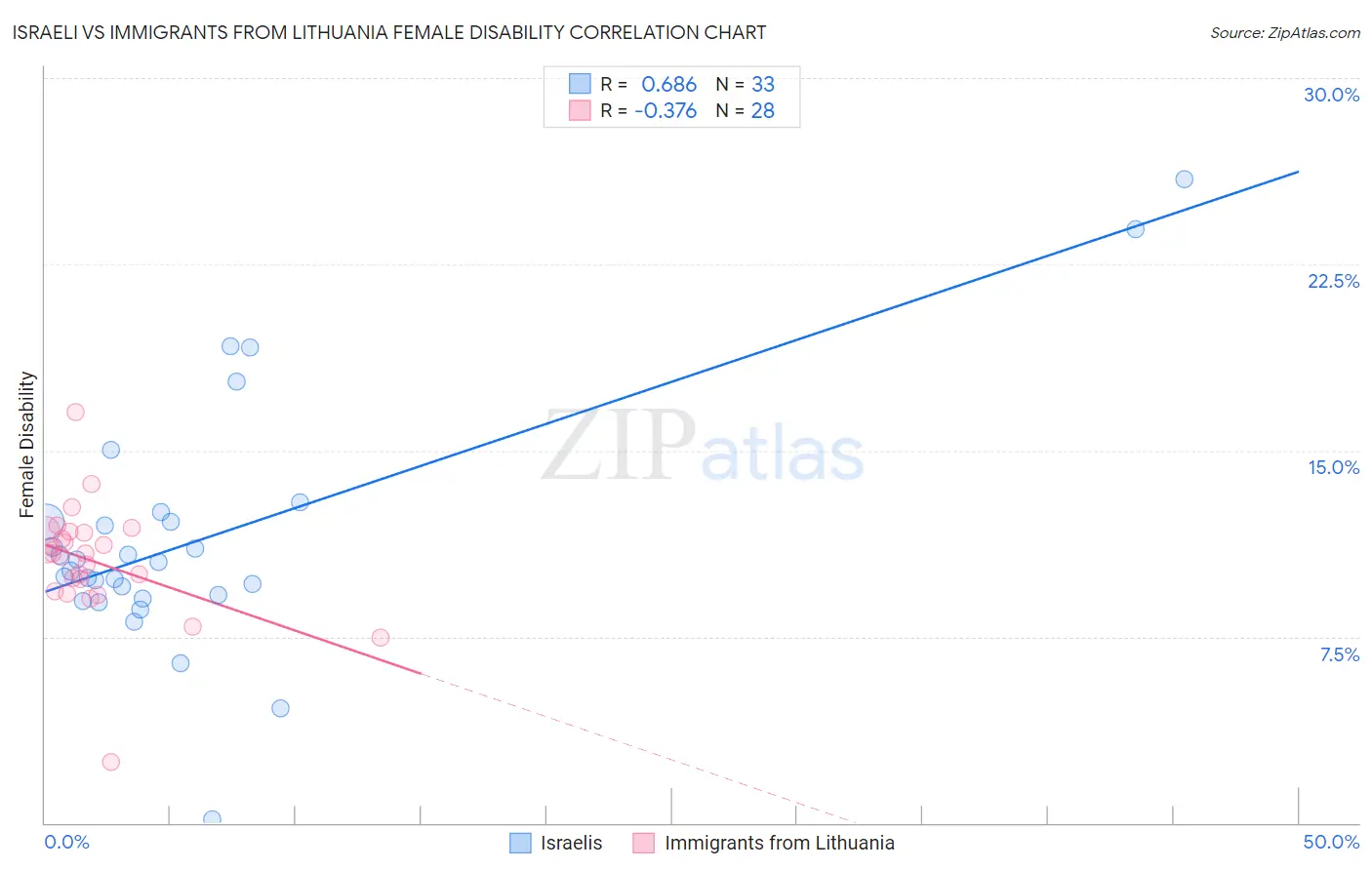Israeli vs Immigrants from Lithuania Female Disability
COMPARE
Israeli
Immigrants from Lithuania
Female Disability
Female Disability Comparison
Israelis
Immigrants from Lithuania
11.2%
FEMALE DISABILITY
100.0/ 100
METRIC RATING
42nd/ 347
METRIC RANK
11.2%
FEMALE DISABILITY
100.0/ 100
METRIC RATING
39th/ 347
METRIC RANK
Israeli vs Immigrants from Lithuania Female Disability Correlation Chart
The statistical analysis conducted on geographies consisting of 211,173,315 people shows a significant positive correlation between the proportion of Israelis and percentage of females with a disability in the United States with a correlation coefficient (R) of 0.686 and weighted average of 11.2%. Similarly, the statistical analysis conducted on geographies consisting of 117,714,022 people shows a mild negative correlation between the proportion of Immigrants from Lithuania and percentage of females with a disability in the United States with a correlation coefficient (R) of -0.376 and weighted average of 11.2%, a difference of 0.15%.

Female Disability Correlation Summary
| Measurement | Israeli | Immigrants from Lithuania |
| Minimum | 0.17% | 2.4% |
| Maximum | 25.9% | 16.5% |
| Range | 25.8% | 14.1% |
| Mean | 11.5% | 10.5% |
| Median | 10.5% | 10.8% |
| Interquartile 25% (IQ1) | 9.1% | 9.6% |
| Interquartile 75% (IQ3) | 12.3% | 11.7% |
| Interquartile Range (IQR) | 3.2% | 2.1% |
| Standard Deviation (Sample) | 5.0% | 2.4% |
| Standard Deviation (Population) | 4.9% | 2.3% |
Demographics Similar to Israelis and Immigrants from Lithuania by Female Disability
In terms of female disability, the demographic groups most similar to Israelis are Afghan (11.2%, a difference of 0.030%), Paraguayan (11.2%, a difference of 0.10%), Mongolian (11.2%, a difference of 0.11%), Cambodian (11.3%, a difference of 0.22%), and Immigrants from Sweden (11.3%, a difference of 0.26%). Similarly, the demographic groups most similar to Immigrants from Lithuania are Mongolian (11.2%, a difference of 0.030%), Paraguayan (11.2%, a difference of 0.050%), Afghan (11.2%, a difference of 0.17%), Immigrants from Ethiopia (11.2%, a difference of 0.21%), and Ethiopian (11.2%, a difference of 0.24%).
| Demographics | Rating | Rank | Female Disability |
| Turks | 100.0 /100 | #30 | Exceptional 11.1% |
| Immigrants | Kuwait | 100.0 /100 | #31 | Exceptional 11.1% |
| Immigrants | Australia | 100.0 /100 | #32 | Exceptional 11.1% |
| Immigrants | Egypt | 100.0 /100 | #33 | Exceptional 11.1% |
| Immigrants | Indonesia | 100.0 /100 | #34 | Exceptional 11.2% |
| Immigrants | Japan | 100.0 /100 | #35 | Exceptional 11.2% |
| Cypriots | 100.0 /100 | #36 | Exceptional 11.2% |
| Ethiopians | 100.0 /100 | #37 | Exceptional 11.2% |
| Immigrants | Ethiopia | 100.0 /100 | #38 | Exceptional 11.2% |
| Immigrants | Lithuania | 100.0 /100 | #39 | Exceptional 11.2% |
| Mongolians | 100.0 /100 | #40 | Exceptional 11.2% |
| Paraguayans | 100.0 /100 | #41 | Exceptional 11.2% |
| Israelis | 100.0 /100 | #42 | Exceptional 11.2% |
| Afghans | 100.0 /100 | #43 | Exceptional 11.2% |
| Cambodians | 100.0 /100 | #44 | Exceptional 11.3% |
| Immigrants | Sweden | 100.0 /100 | #45 | Exceptional 11.3% |
| Immigrants | Nepal | 100.0 /100 | #46 | Exceptional 11.3% |
| Jordanians | 100.0 /100 | #47 | Exceptional 11.3% |
| Zimbabweans | 100.0 /100 | #48 | Exceptional 11.3% |
| Tongans | 100.0 /100 | #49 | Exceptional 11.3% |
| Inupiat | 100.0 /100 | #50 | Exceptional 11.3% |